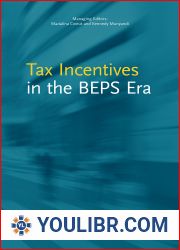
BOOKS - Tax Incentives in the BEPS Era (IBFD Tax Research Series Book 3)

Tax Incentives in the BEPS Era (IBFD Tax Research Series Book 3)
Author: Madalina Cotrut
Year: September 5, 2018
Format: PDF
File size: PDF 3.6 MB
Language: English
Year: September 5, 2018
Format: PDF
File size: PDF 3.6 MB
Language: English
- The information in this book was last reviewed on 1 May 2018 - * Recent tax developments aimed at mitigating the possibilities of base erosion and profit shifting are expected to increase the importance and popularity of tax incentives. This is due to the fact that states will want to remain competitive on the international stage and multinational enterprises will look for other opportunities to minimize their tax liabilities. This book seeks to answer the following essential questions, from both a practical and an academic - Will tax incentives be the 21st century tool for tax planning structures? - Will states need to introduce more tax incentives in the future in order to be more competitive? - What are the effects of the anti-abuse measures adopted by the EU Member States and recommended by the OECD on tax incentives? - What are the challenges of securing the use of tax incentives? - What new tax policy challenges will tax incentives bring about? This book answers these questions by analysing selected tax incentives that are commonly promoted by both developed and developing states, particularly those tax incentives that are of relevance to corporate income taxation. This analysis is performed with the objective of presenting the expected new role of tax incentives in the changing international tax arena, assessing whether - and, if so, which - tax incentives can be used or will be prone to abuse for tax planning purposes and examining the impact of the measures developed and or adopted by the OECD and the European Union on tax incentives. Tax Incentives in the BEPS Era is essential reading for anyone working with tax incentives, tax planning tools and anti-abuse measures in their activities, including tax advisers, tax lawyers, tax administrators and tax policy makers. * Contributions by Vanessa Arruda Ferreira, Khadija Baggerman-Noudari, Aleksandra Bal, Diana Calderon Manrique, Madalina Cotrut, Larisa Gerzova, Victor van Kommer, Antti Laukkanen, Emily Muyaa, Rene Offermanns, Lydia G. Ogazon Juarez, Magdalena Olejnicka, Andreas Perdelwitz and Rachel Saw.
















































